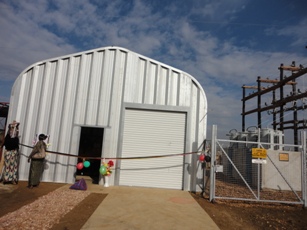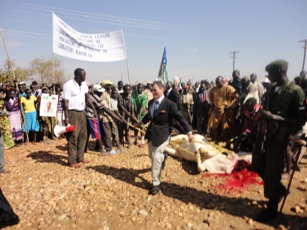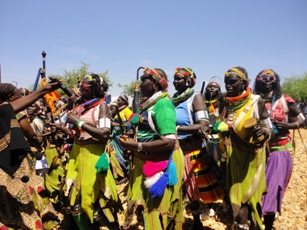USAID inaugurates power plant in Kapoeta, E. Equatoria
By Richard Ruati
February 4, 2011 (KAPOETA) – The U.S. Consul General in Juba, Ambassador R. Barrie Walkley, and the governor of Eastern Equatoria state, Louis Lobong Lajore, inaugurated a 894-kilowatts power plant built as post-conflict peace dividend to the people of Kapoeta South county in Eastern Equatoria state.

In a ceremony at the power plant’s compound, Ambassador Walkley hailed the project as the second large electrification project to be completed after the south’s successful completion of the referendum. USAID is hoping to open a another power plant in Maridi later this month to go with the plant in Yei opened in 2008.
Ambassador Walkley said the plant will help ensure the supply of electricity to the market town of Kapoeta.
Since 2005, USAID has provided nearly $20 million to support the three power plant projects, building electric generation and distribution infrastructure, in Yei, Kapoeta, and Maridi.
He added that “similar project has been demonstrated in Yei, we know this project will have an immense impact on promoting economic activity; enhancing security through street lighting; improving reliability of electricity to schools and clinics; and providing convenience to households.”
The ambassador lamented that the inauguration marks a new era for the people who live and work in Kapoeta – “I want to tell you that on behalf of the American people, we stand with you in hope and partnership, looking forward to a bright and prosperous future for southern Sudan. Thank you very much.”
With an output of 894-kilowatt, the plant will cover roughly 900 customers by September. Currently the Kapoeta power plant can now serve about 725 customers.
Garang Diing Akuong, Government of South Sudan (GoSS) Minister of Energy and Mining, at the event said, “It is the right of the people of Kapoeta as a compensation for their struggle in the liberation of southern Sudan – no more wars, we need educated our people to enjoy the fruits of peace in a friendly manner.”
He thanked the U.S. government, through USAID, for investing millions of dollars in the market towns of Yei, Kapoeta and Maridi.
Electricity heats homes, provides light, and powers businesses, contributing to economic growth and higher living standards. While South Sudan’s government does not yet provide for the entire region, USAID support is bringing electricity to remote villages through the construction of rural electrification.

Louis Lobong Lajore, said at the ceremony that the project seeks to open new income-generating opportunities to the energy sector, which still formally and informally employs idle youth members of the communities in Kapoeta town.
“Energy is essential in improving the living conditions of including the economy of a state or a country. Eastern Equatoria like other ten states in Southern Sudan depends on firewood as source of energy for cooking and heating. The state runs the risk of deforestation and environmental degradation – if the illicit indiscriminate cutting of wood for fuel continues,” Labong said.
Labong added that “with the completion of Kapoeta power project, as a stepping stone; the state is determined to address the issue of lack of sustainable energy source in the whole state for sustainable livelihood, industrial development and enhance economic growth.”
Kamilo John, a Kapoeta resident, told Sudan Tribune that the power plant was, “a project that despite its remote location actually stands up to tackle two major concerns to Kapoeta development: business sector and rural development”.
He said “the project did not talk big, but put action on the ground.” Almost 80 percent of southern Sudan’s rural population does not have access to electricity.
Political unrest and war destroyed much of infrastructure in Southern Sudan. The lack of electricity, in particular, has contributed to making like hard for many in the region and paralyze the region’s economic recovery. Electricity is one of the basic needs Toposa communities in Kapoeta county say they need to improve their quality of life.
Ambassador Walkley told the communities that they played an active part in determining how the utility should be managed. During a meeting in Kapoeta last September, the community resolved that the utility should be managed and operated by an electric cooperative similar to the model now used in Yei. In the next month, USAID will assess the economic and financial viability of the cooperative model compared with others, and provide recommendations to promote financial sustainability.
Kapoeta on South Sudan’s border with Kenya and is one of the main towns in Eastern Equatoria. It also was a place of strategic importance during the long civil war that raged on and off nearly for 23 years before a peace deal in 2005. The indigenous or Toposa pastoral communities are located in the semi-arid county of Kapoeta South in Eastern Equatoria.

The facility is changing the face of Kapoeta; the town is expecting a flock of industries and big businesses after the independence of the south, due to take place in July following the referendum in January.
David Koriang, Kapoeta, a youth Leader told Sudan Tribune: “We shall dare to share the price as consumers will save 50 percent of what they are spending on kerosene and diesel to power noisy-inconvenient generators, and they’re getting much larger output from investment by the American people.”
Koriang adds that, “electricity shortages can directly impede the economic development of a strategically positioned town like Kapoeta, apart from the environmental pollution caused by the use of dirty kerosene and diesel.”
“Today, electrification project represents a viable market for modern energy services. The rural communities are willing to for reliable electricity services,” he stressed.
Kapoeta town is looking eagerly to the day in mid December when the lights are expected to banish darkness on the Kapoeta street when the power plant is switched on. Thereafter, until the project is completed in September 2011, the young utility will be consolidated with staff trained in all aspects of utility operation households connected to electricity and business revitalized with new electricity services.
The United States is the single largest donor to Sudan, contributing nearly $10 billion in assistance to Sudan and eastern Chad since the signing of the Comprehensive Peace Agreement in 2005.
The Kapoeta project is implemented by USAID partner the Louis Berger Group, in partnership with the National Rural Electric Cooperative Association. The project comprises construction of power generation and distribution facilities, customer connections, establishment of a utility, and training of utility staff. Training provided in Kapoeta covered commercial and technical aspects such as meter reading and billing, accounting, linemen skills, and human resource and customer relations, among others.
(ST)

Ito
USAID inaugurates power plant in Kapoeta, E. Equatoria
This is a very wonderful development in eastern equatoria. Power plant is what we have been looking for to be built all in southern states. Please Usaid, extend the project to all south sudan states. We are ready to assist you in whatever contribution that we can render to the development of our baby country. Your excellency Brigadier Louis Lobong, thank you for your hardwork and presentation on the issues facing the state, I hope your entire parliament follow your footsteps.
May God bless all